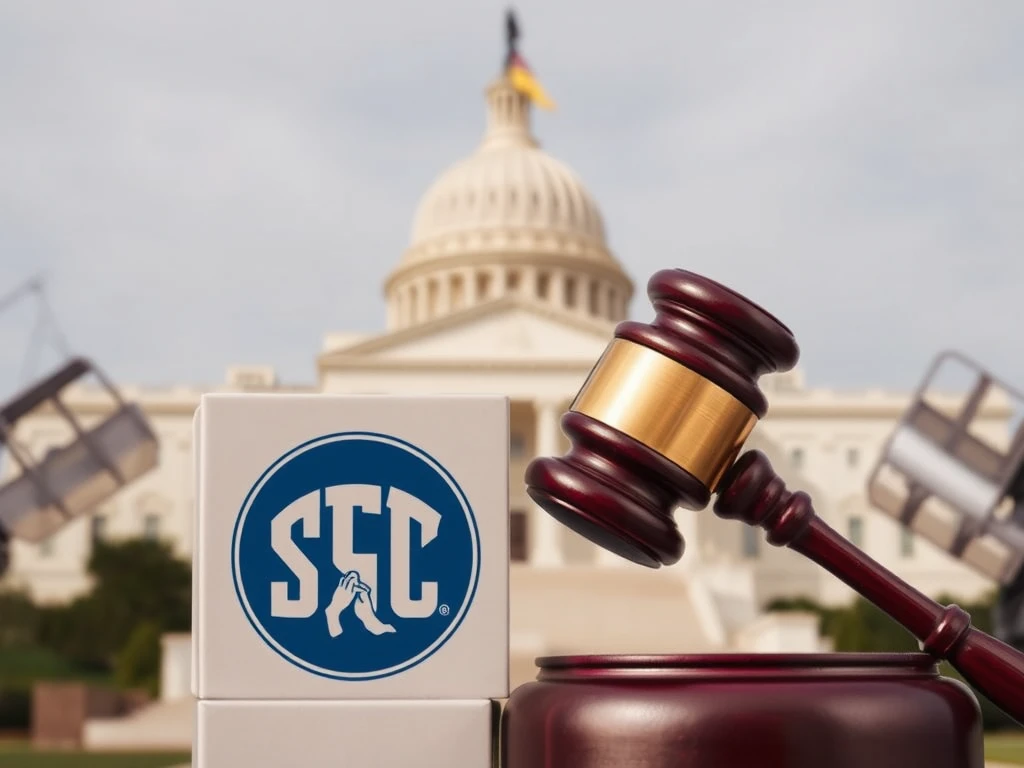Crucial Approval: Senate Committee Advances Trump’s SEC Chair Pick, Signaling Shift in Crypto Regulation

The wheels of Washington are turning, and the cryptocurrency world is watching closely. In a significant development, President Trump’s nominee for Securities and Exchange Commission (SEC) chair, Paul Atkins, has successfully navigated a critical hurdle. The Senate Banking Committee has given its nod, pushing Atkins closer to the top regulatory seat. What could this mean for the future of crypto regulation and the digital asset landscape? Let’s dive into the details of this pivotal moment.
Senate Banking Committee Greenlights Atkins’ SEC Chair Nomination
In a session held on April 3rd, the Senate Banking Committee convened to vote on key government positions. Among the nominees was Paul Atkins, President Trump’s pick for SEC Commissioner. The committee’s decision carries weight, signaling the potential direction of financial regulation in the United States, especially concerning the burgeoning cryptocurrency sector. After deliberations, the committee voted 13-11 in favor of Atkins, propelling his nomination to the next stage – a full Senate vote.
This confirmation vote by the Senate Banking Committee is a crucial step in Atkins’ journey to potentially becoming the next SEC chair. It indicates that he has garnered sufficient bipartisan support within the committee, despite some reservations expressed by certain members. The vote tally itself, 13-11, reveals a closely divided committee, highlighting the contentious nature of regulatory appointments and the varying perspectives on financial oversight.
What Does Paul Atkins Bring to Crypto Regulation?
Senator Tim Scott, the committee chair, voiced optimism about Atkins’ potential contribution, stating that he would bring “much-needed clarity for digital assets.” This statement is particularly noteworthy for the crypto community, which has long sought clearer regulatory guidelines from the SEC. The lack of definitive rules has often been cited as a barrier to mainstream adoption and innovation within the digital asset space.
Atkins’ background and stance on regulation are key factors to consider. While the specifics of his approach to crypto are still unfolding, his general philosophy and past experience can offer insights. It is anticipated that Atkins may favor a more principles-based regulatory approach, potentially offering more flexibility and less prescriptive rules compared to his predecessors. This could be perceived as a welcome shift by many in the crypto industry who advocate for innovation-friendly regulation.
Concerns and Counterarguments: Elizabeth Warren’s Stance
However, not everyone is equally enthusiastic about Atkins’ nomination. Ranking member Elizabeth Warren voiced strong concerns, suggesting that Atkins might be inclined to favor “billionaire scammers” and weaken federal agencies. She specifically mentioned figures like Sam Bankman-Fried and Elon Musk, raising questions about Atkins’ commitment to rigorous enforcement and consumer protection.
Warren’s concerns reflect a broader debate about the appropriate level of regulation and the balance between fostering innovation and safeguarding against financial misconduct. Her remarks underscore the existing tensions and differing viewpoints within the Senate regarding financial oversight, particularly in emerging sectors like cryptocurrency. The debate also touches upon the influence of political ideologies on regulatory appointments and the potential impact on enforcement priorities.
Next Steps: Full Senate Vote and Potential Timeline
With the Senate Banking Committee approval secured, Atkins’ nomination now moves to the full Senate for a floor vote. Given the Republican control in the Senate, experts suggest that Atkins is likely to be confirmed. The timing of this vote is yet to be determined, but it is anticipated to occur in the coming weeks. The full Senate vote will be the ultimate test of Atkins’ nomination, requiring a simple majority for confirmation.
If confirmed by the Senate, Paul Atkins will take over former Chair Gary Gensler’s term and is nominated for an additional term ending in 2031. This long tenure could provide him with significant influence over SEC policy and direction for years to come. His actions and decisions as SEC chair will be closely monitored by the financial industry, especially the cryptocurrency sector, as they navigate the evolving regulatory landscape.
Potential Impacts on the Crypto Market
The confirmation of Paul Atkins as SEC chair could have significant implications for the cryptocurrency market. Here’s a breakdown of potential impacts:
- Increased Regulatory Clarity: As Senator Scott mentioned, Atkins is expected to bring more clarity to crypto regulation. This could involve issuing clearer guidelines on what constitutes a security in the digital asset space, providing a more predictable framework for crypto businesses.
- Shift in Enforcement Approach: A potentially more principles-based approach under Atkins might mean a shift in enforcement priorities. It could lead to a focus on egregious fraud and market manipulation, while potentially providing more leeway for compliant innovation.
- Market Sentiment Boost: Increased clarity and a perceived more innovation-friendly regulatory environment could boost market sentiment in the crypto sector. This could attract more institutional investment and foster further development within the industry.
- Ongoing Scrutiny: Despite potential shifts, regulatory scrutiny of the crypto market is unlikely to diminish entirely. The SEC will still play a crucial role in overseeing the space and ensuring investor protection.
Conclusion: A New Chapter for SEC and Crypto?
The advancement of Paul Atkins’ nomination to SEC chair out of the Senate Banking Committee marks a significant moment. While his confirmation is not yet final, it represents a powerful signal of potential shifts in regulatory approaches towards cryptocurrency and digital assets. The crypto community is keenly awaiting the full Senate vote and the subsequent direction the SEC will take under Atkins’ leadership. Will it be an era of greater clarity and innovation-friendly regulation, or will concerns about enforcement and investor protection take center stage? Only time will tell, but one thing is certain: the regulatory landscape for crypto is poised for further evolution.









